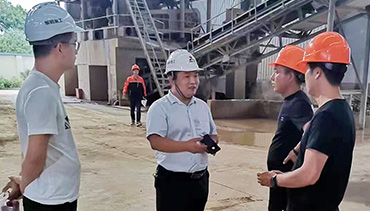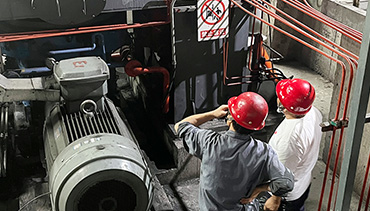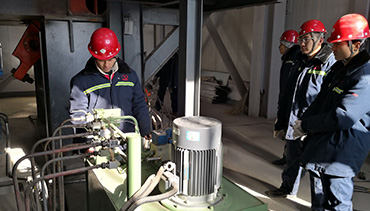

Henan LIMING Heavy Industry Science and Technology Co. LTD which mainly manufacture large and medium-sized crushing and grinding equipments was founded in 1987. It is a modern joint-stock corporation with research, manufacturing and sales together
MOBILE CRUSHERS
Stationary Crushers
Grinding Mills
Accessory Equipment
OUR
Applications
LATEST
NEWS

Limestone powder brings benefit to concrete mixing plant
Mobile Crushing Plant Solutions for Flexible and Efficient Aggregate Production 30/1/2026
As mining and construction projects become increasingly dynamic, the demand for flexible, efficient, and fast-deploying crushing solutions continues to grow. Compared with traditional stationary crushing plants, mobile crushing plants offer significant advantages in mobility, installation time, and operational flexibility.
Mobile crushing plants have become an ideal choice for quarrying, aggregate production, mining operations, and construction waste recycling.
With advanced technology and extensive project experience, LIMING Heavy Industry provides reliable mobile crushing plant solutions tailored to diverse application requirements.
A mobile crushing plant is an integrated system that combines crushing, screening, and conveying equipment on a mobile platform.
Key characteristics include:
Rapid installation and commissioning
Flexible relocation between job sites
Reduced civil foundation requirements
Integrated and compact structure
Mobile crushing plants are typically available in tracked (crawler-type) and wheeled (tire-type) configurations.
Tracked mobile crushers are equipped with crawler chassis and are ideal for:
Mining and quarrying sites
Uneven or rough terrain
Frequent relocation within a project
Advantages:
Strong adaptability to complex ground conditions
Independent power system
High mobility on-site
Wheeled mobile crushers are designed for:
Construction and demolition projects
Road and urban construction
Sites requiring long-distance transportation
Advantages:
Easy transportation by truck
Lower investment cost
Suitable for temporary projects
Choosing the right type depends on project location, terrain, and mobility requirements.
Primary crushing stage
Large feed acceptance
Suitable for hard and medium-hard materials
Secondary and tertiary crushing
High capacity and efficiency
Ideal for hard rock and aggregate production
Excellent particle shaping
Suitable for limestone and construction waste
High-quality aggregate production
Material classification
Closed-circuit operation
Final product quality control
These units can operate independently or be combined into a complete mobile crushing and screening system.
Mobile crushing solutions are widely used in:
Quarry and aggregate production
Mining operations
Construction waste recycling
Road and infrastructure projects
Temporary or remote job sites
Their flexibility allows operators to adjust production capacity and configuration based on changing project needs.
Key benefits include:
Reduced transportation cost of raw materials
Faster project startup
Lower installation and dismantling time
Improved operational flexibility
Reduced overall project investment
Mobile crushing plants help customers achieve faster return on investment.
Mobile crushing plants are available in a wide capacity range, typically:
100–300 TPH for compact units
300–600+ TPH for large-scale mobile systems
Capacity depends on crusher type, material characteristics, and process configuration.
LIMING Heavy Industry offers:
Tracked and wheeled mobile crushers
Modular mobile crushing and screening systems
Professional engineering support
Customized solutions for various applications
Each mobile crushing plant is designed to deliver high efficiency, reliability, and long service life.
Mobile crushing plants provide a powerful solution for projects that require flexibility, fast deployment, and efficient production. By eliminating the limitations of fixed installations, mobile crushing solutions help customers adapt to changing site conditions and reduce overall costs.
With proven technology and global project experience, LIMING Heavy Industry continues to deliver mobile crushing plant solutions that meet the evolving needs of the mining and aggregate industries.
Basalt Crushing Solutions for High-Strength Aggregate Production 23/1/2026
Basalt is widely used in high-performance concrete, asphalt pavement, railway ballast, and infrastructure projects due to its excellent mechanical strength and durability. However, basalt is also known as one of the most difficult materials to crush because of its high hardness and strong abrasiveness.
To achieve stable production, high-quality aggregates, and acceptable operating costs, basalt crushing requires a carefully engineered crushing and screening solution.
With extensive experience in hard rock applications, LIMING Heavy Industry provides reliable basalt crushing solutions tailored for high-strength aggregate production.
Basalt presents several technical challenges in crushing operations:
Very high compressive strength
Strong abrasiveness leading to rapid wear
Difficult-to-shape particles
High demand for equipment durability
These characteristics make basalt unsuitable for impact-dominated crushing systems in early stages. Improper equipment selection often results in excessive wear and frequent downtime.
Jaw crushers are ideal for basalt primary crushing due to:
Strong crushing force
Ability to handle large feed sizes
Excellent structural strength
Reliable operation under heavy loads
They efficiently reduce large basalt blocks into sizes suitable for secondary crushing.
For basalt applications, cone crushers are the most recommended secondary crushers.
Key advantages:
High crushing efficiency
Excellent resistance to abrasive wear
Stable continuous operation
Consistent product gradation
Cone crushers outperform impact crushers in basalt applications in terms of liner life and operating cost control.
When strict aggregate shape requirements are required, shaping stages can be added using:
Fine cone crushers
Vertical shaft impact crushers (VSI)
VSI crushers are typically used only in the final shaping stage to balance aggregate quality and wear cost.
Basalt crushing plants almost always adopt closed-circuit configurations.
Key benefits:
Precise control of final aggregate size
Elimination of oversized particles
Reduced re-crushing and energy waste
Stable product quality
High-efficiency vibrating screens play a critical role in maintaining consistent production.
Typical configuration:
Jaw crusher
Cone crusher
Vibrating screen
Suitable for:
Regional road construction projects
Commercial aggregate supply
Typical configuration:
Jaw crusher
Multiple cone crushers
Multi-deck vibrating screens
Suitable for:
Highway and railway projects
Large infrastructure developments
Continuous, high-output production
These systems are designed for maximum durability and long service life.
Because wear parts cost is a major concern, effective strategies include:
Selecting wear-resistant liner materials
Optimizing crushing chamber profiles
Maintaining consistent feed distribution
Avoiding unnecessary impact crushing
Engineering-based system design significantly reduces wear cost per ton.
High-quality basalt aggregates require:
Proper particle shape
Stable gradation
Controlled fines content
Combining compression crushing with final-stage shaping allows producers to meet strict infrastructure aggregate standards.
LIMING Heavy Industry provides complete basalt crushing solutions including:
Customized process design
Heavy-duty jaw and cone crushers
High-efficiency screening equipment
Professional engineering support
Each solution is tailored to project-specific requirements, ensuring reliable and cost-effective operation.
Basalt crushing demands robust equipment, optimized process design, and professional engineering support. With the right crushing solution, producers can achieve high-strength aggregates, stable production, and controlled operating costs.
By partnering with LIMING Heavy Industry, customers gain access to proven basalt crushing solutions designed for long-term performance.
Granite Crushing Solutions for High-Quality Aggregate Production 16/1/2026
Granite is one of the most commonly used materials in high-strength concrete, road construction, and infrastructure projects. Due to its high hardness, strong abrasiveness, and dense structure, granite places strict requirements on crushing equipment and process design.
To achieve stable production, high-quality aggregates, and controlled operating costs, granite crushing requires a well-engineered crushing and screening solution, not just powerful machines.
With extensive experience in hard rock applications, LIMING Heavy Industry provides reliable granite crushing solutions for aggregate producers worldwide.
Granite is classified as a hard and abrasive rock, which presents several challenges during crushing:
High compressive strength
Strong abrasiveness causing rapid wear
Difficult-to-shape particles
High demand for stable crushing force
These characteristics make granite unsuitable for simple crushing configurations. Improper equipment selection often leads to excessive wear, low output, and high maintenance costs.
Understanding granite properties is the foundation of an efficient crushing solution.
Jaw crushers are widely used as primary crushers in granite crushing due to their:
Strong crushing force
Ability to handle large feed sizes
Stable performance under heavy load
Simple and robust structure
They effectively reduce large granite blocks into sizes suitable for secondary crushing.
For granite applications, cone crushers are the preferred choice for secondary crushing.
Advantages include:
High crushing efficiency
Excellent wear resistance
Stable output capacity
Uniform particle size distribution
Cone crushers are specifically designed to handle hard and abrasive materials like granite.
When high-quality, cubical aggregates are required, additional shaping stages may be added using:
Fine cone crushers
Vertical shaft impact crushers (VSI)
These stages improve particle shape while maintaining acceptable wear costs.
Granite crushing plants typically operate in closed-circuit configurations.
The role of screening includes:
Precise size classification
Control of final aggregate gradation
Prevention of oversized material in final products
Reduction of unnecessary re-crushing
High-performance vibrating screens ensure stable product quality and efficient plant operation.
Typical configuration:
Jaw crusher
Cone crusher
Vibrating screen
Applications:
Commercial aggregate production
Regional construction projects
Typical configuration:
Jaw crusher
Multiple cone crushers (secondary & tertiary)
Multi-deck vibrating screens
Applications:
Infrastructure and highway projects
Large quarry operations
Continuous high-output production
These systems are designed for long-term, heavy-duty operation.
Wear parts consumption is a major cost factor in granite crushing.
Effective strategies include:
Selecting appropriate liner materials
Optimizing crushing chamber design
Maintaining uniform feed distribution
Avoiding overloading and excessive reduction ratios
A properly designed system significantly reduces wear cost per ton.
High-quality granite aggregates require:
Controlled particle shape
Consistent gradation
Minimal fines content
By combining compression crushing with proper shaping stages, granite crushing plants can meet strict construction aggregate standards.
LIMING Heavy Industry provides complete granite crushing solutions including:
Customized process design
High-performance jaw and cone crushers
Efficient screening systems
Professional engineering support
Each solution is tailored to material conditions, capacity requirements, and final product specifications.
Granite crushing is a demanding application that requires robust equipment, precise process design, and professional engineering support. With the right crushing solution, aggregate producers can achieve stable output, high-quality products, and controlled operating costs.
By partnering with LIMING Heavy Industry, customers gain access to proven granite crushing solutions designed for long-term success.
Why
Choose Us

Passionate

Professional

Support
